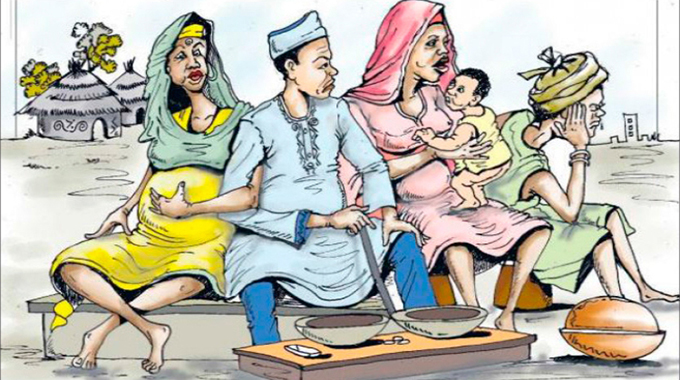Of Mambongi, polygamy and hateful names

Do the elders not say it is only adjacent trees, whose branches rub against each other?
Or, is the fecund point not that people who are together frequently, inevitably quarrel?
As much as elders say, hoes that dig together never miss knocking one another.
Only the hippopotamus with which a crocodile travels knows the pains of a crocodile, animal conservationists would aptly put it. Or, if a flock of birds travels without co-ordination, they break each other’s wings.
The lingua franca above captures the squabbling in uncle Mambongi’s polygamous love nest of 11 wives.
Never mind what happened to this villager, the last time he visited Mambongi.
This time around, a vehicle breakdown forced me to foot six kilometres to Mambongi’s homestead, for a deserved rest while awaiting the mechanic to bring me a new CV joint for the left front wheel.
It was mid evening.
Moonlight slanted down through the new tree leaves and blossoms on Musasa trees, making whimsical coloured patterns on the ground.
There was silence in the air, a faint warm breeze, stirred the tree branches from the direction of Dande River, bringing with it a fragrance of new tree leaves and blossoms and a breath of something languid, that induced some idleness in this villager’s mind. There was voluptuousness and fear of the night.
This villager footed on. Avoiding dotted cow dung and goat droppings. Cow dung naturally attracts flies and each footstep sent the flies swarming off.
Once in a while a dog barked from a distance, immediately reciprocated by another. And, another! Then there was a cacophony of howling.
The village was obviously getting nearer and nearer. This villager’s ears started faintly picking up distant voices. There was the crankle of cattle bells, too.
The wind never stopped. The grass seemed to be dancing under the moonlight, broken into checkered patches by the movement of the leaves and the blossoms of the trees. As the village approached, the half-moon was almost posting itself into the western belly of the earth, leaving a silhouette hue that coloured the grass golden.
The dainty patches of light that flickered and quivered through the leaves played the trick.
Fire flies or fire-coloured butterflies aided the colour, swaying sideways and upwards, dimming and flashing. Memories of ghosts flashed on this villager’s mind but the village suddenly opened up.
Mambongi’s homestead needs no description for the avid readers of this column. But for the avoidance of doubt Mambongi, is a kraalhead and hey, the man has 11 wives. He has a central bedroom and each of the wives is given a weeklong conjugal rights duty and so, it takes 10 weeks before duty revisits each woman.
This villager is no good mathematician, but counting up to 10 weeks is easy because it is not beyond the number of his fingers.
Mambongi’s bedroom is an unassuming one room whose grass totters with age.
It’s mud-and-pole wall leans backwards, with a little door that is always firmly closed.
The wife on duty brings her linen for the week-long duty. The room has kept many secrets. This room knows every wife, but never says a word.
It knows many family secrets, the gossip and lies. It has listened to many quarrels between Mambongi and his wives.
The bedroom antics and indeed, the scandals too! But it remains quiet. In its belly, most if not all, of Mambongi’s children were manufactured.
The bed . . . the bed, the bed! The bed consisted of four forked wooden posts, firmly staked in the ground, with a rectangular reed mat and a bale stuffed with cotton straight from the fields.
After greetings formalities I was allocated a room to sleep in. It was yet another spectacle but tired as I was, I needed to sleep. The usual happened.
By the turn of each hour Mambongi came to check on this villager, lighting the room with a torch through the small triangular window.
It was not out of love but out of fear that one of his sex-starved wives would cheat on him with me.
Do elders in the village not say, a person who roasts a locust does not blink, lest it burns and becomes inedible?
On five occasions he came and on five occasions he found none of his wives in bed with this villager.
This villager will not dwell on how Mambongi’s wives cheat on each other’s duties.
This villager will not talk about the use of crying babies to bait Mambongi into the bedrooms of those wives not on duty but sex starved.
Once he goes in, you can guess what happens in that hut. In the morning, we sat for hours, discussing issues of governance and state, but not on dry throats.
We drank a lot. Discussed. Sipped. Drank. Guzzled. Talked, talked, talked and talked.
One striking feature was the decorum on the huts and the names of Mambongi’s children.
Each hut was well decorated with chalk, red soil and cow dung. Each wall had something inscribed. Messages like “leave me alone”, “Stop gossiping”, “You will soon get tired”, “peace”, “I will not speak,’’ “why do you hate me?” “This husband is for us all” were splashed all over the walls.
But it was the names of the children that told stories. The first wife had son named Pakuravanhu Mashoko Anowanda, quite a mouthful loosely translated, (where many people stay together squabbles are plenty). Because it’s a mouthful, it was shortened to Paku.
The second wife had a son, Zvakaoma (its tough). It was shortened to Zvaka.
The fourth wife came out shouting, Nhamohaiurayi (Hard life never kills). The third wife refused to be outdone, naming her daughter Zvichapera (there is always and end to everything). The six wife had Muzondiwa (the hated one).
Not to be outdone the seventh wife came up with two scorchers Muchandiguta (You will have enough of me) and Ndaizivei (had I known).
The ninth wife came up with Garikayi (I wish you the best).
The 11th wife brew her own, Makanyara
Then there was a hodgepodge talking names for children I could hardly identify with each wife, like Kurauzvione, Kurauone, Muchaneta, Maidei, Muchadura,
Muchanyara, Saraugarike, Dhererai, Nyarai, Taurai, Muchanyara, Mativavarira, Matinyanya, Matimadii? shortened to Mati, Zvanyadza, Mativenga and Dadirai, among others. Each told a timely story.
Even dogs had talking names too: Mukuru Haadaro, Tsoka Dzehwahwa (the footprints of a drunkard), Muchaona or Musaona in Korekore dialect (warning for what will happen later), Kugara Kunzwana (the need for social cohesion and unity).
This villager could not quite make it how Mambongi managed to accept all those names but still managed to run the home in control.
Most of the names, this villager learnt, were out of the desire by the wives to compete for Mambongi and outwit each other for attention.
At the end, this villager got the impression that you can never recall your words, once they are out for the elders say wind is never caught by hand.
As the monkey gets higher and higher climbing the tree it exposes its unflattering behind.
Dreams can be told, but not acted. It is sometimes easy to say a thing, while you can’t do it.









Comments